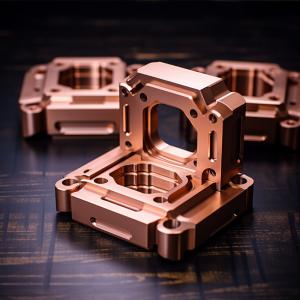
Add to Cart
Custom Milled Machining CNC Part Machining Precision Milling Service CNC Copper
CNC Part
At its core, CNC machining is a subtractive manufacturing technique utilized to fashion parts
through the controlled removal of material from a workpiece or its stock.
The machinery's actions are orchestrated by preprogrammed software and codes, directing the
intricate movement of its components. The array of CNC machining equipment spans turning
mills, lathes, grinders, and plasma-cutting machines.
Product Details
| Common Copper Materials | |
| No. | Properties |
| Copper C110 | Copper (C110) is a pure at 99.90% copper alloy, with universal for electrical applications high thermal conductivity and good corrosion resistance. |
| Copper C101 | Copper (C101), 99.99% pure, is a copper alloy with excellent conductivity and high corrosion resistance and toughness. |



We specialize in the production of custom-made products and offer surface treatment services
tailored to meet our customers' specific requirements and industry standards.
Our comprehensive solutions are both efficient and cost-effective, making us a one-stop
destination with the capacity and capability to provide integrated services.
| Name | Machining Marks |
| As machined | Visible, light surface scratches |
| Smooth machining | Visible, light surface scratches |
| Fine machining | Slightly visible |
| Polishing | Removed on primary surfaces |
| Bead blasting | Removed for non-cosmetic, removed on primary surfaces for cosmetic |
| Brushing | Reduced for non-cosmetic, removed on primary surfaces for cosmetic |
| Powder coating | Removed |
CNC Machining Applications
CNC machining is a prevalent subtractive manufacturing process, and its utilization is extensive
across various industries. Some of the industries that heavily rely on CNC machining include:
1. Aerospace:
The aerospace industry extensively utilizes CNC machining for the production of precise and
complex components used in aircraft and spacecraft.
2. Automotive:
In the automotive sector, CNC machining plays a crucial role in manufacturing high-precision
components for vehicles, ensuring efficiency and reliability.
3. Aviation:
The aviation industry relies on CNC machining for the production of components that require
exceptional precision and adherence to strict quality standards.
4. Transportation:
The transportation industry, encompassing various modes such as trains and ships, utilizes CNC
machining for the fabrication of critical components for smooth and reliable operation.

Company Profile


FAQ's
1. What tolerances can I achieve with CNC machining?
Our standard tolerances for CNC machining are set at 0.05 microns, providing precision suitable
for the majority of commercial and industrial applications. If your project requires even closer
tolerances, we welcome consultation to address specific requirements and ensure optimal results.
2. Key Advantages of CNC Machining:
1. Rapid Prototyping: CNC machining excels in rapid prototyping, allowing for the quick creation
of prototypes to test and iterate designs.
2. Efficient Production: The ability to produce full-scale production parts rapidly makes CNC
machining a time-efficient manufacturing process.
3. Precision and Accuracy: CNC machining ensures a high level of precision and accuracy in
manufacturing, meeting tight tolerances for parts of various sizes.
4. Tight Tolerance Machining: CNC machining offers the capability for tight tolerance machining,
ensuring the exact specifications of CNC parts are met consistently.
5. Flexibility: CNC machining provides maximum flexibility in terms of production volume, pricing,
lead times, and the selection of materials and finishes for the manufactured parts.
3. Quality Assurance Commitment:
We prioritize customer trust by implementing established quality management principles to elevate
customer satisfaction and consistently enhance our performance and capabilities.
Drawing on decades of experience, we adhere to stringent regulations and maintain PPAP
compliance for the automotive, aerospace, and medical device industries.
These industries serve as benchmarks for all the products we manufacture.
4. What industries do you typically work in? Who are your typical customers?
We have an extensive presence across various industries, working with heavy equipment
manufacturers, general commercial businesses, and companies in industrial, transportation,
medical, and consumer sectors, among others.
Our clientele spans the United States, Europe, and worldwide. Despite the diversity in industries,
our customers share a common requirement for high-quality parts machined to specifications,
delivered on time, and within budget.